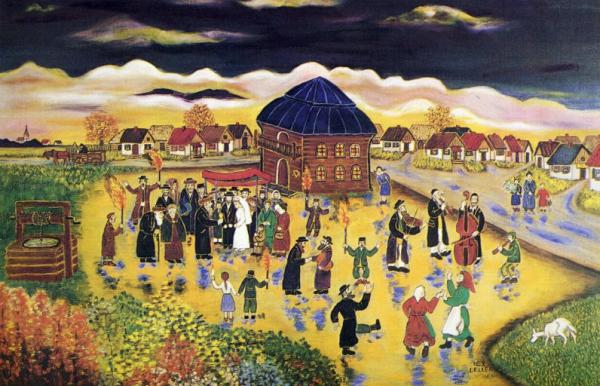Purim (Hebrew: פּוּרִים (help·info) Pûrîm "lots", from the word pur, related to Akkadian pūru) is a Jewish holiday that commemorates the deliverance of the Jewish people in the ancient Persian Empire forming a plot to destroy them. The story is recorded in the Biblical Book of Esther (Megillat Esther). According to the Book of Esther, Haman, royal vizier to King Ahasuerus (presumed to be Xerxes I of Persia), planned to kill all the Jews in the empire, but his plans were foiled by Mordecai and his adopted daughter Queen Esther. The day of deliverance became a day of feasting and rejoicing. Purim is celebrated by giving reciprocal gifts of food and drink (mishloach manot), giving charity to the poor (mattanot la-evyonim), a celebratory meal (se'udat Purim), and public recitation of the Scroll of Esther (kriat ha-megillah), additions to the prayers and the grace after meals (al hannisim). Other customs include drinking wine, wearing of masks and costumes, and public celebration. Purim is celebrated annually according to the Hebrew calendar on the 14th day of the Hebrew month of Adar (Adar II in leap years), the day following the victory of the Jews over their enemies. In cities that were protected by a surrounding wall at the time of Joshua, Purim is instead celebrated on the 15th of the month on what is known as Shushan Purim, since fighting in the walled city of Shushan continued through the 14th. Today, only Jerusalem celebrates Purim on the 15th. Like Hanukkah, Purim has more of a national than a religious character, and its status as a holiday is on a lesser level than those days ordained holy by the Torah. Accordingly, business transactions and even manual labor are allowed on Purim. A special prayer ("Al ha-Nissim"—"For the Miracles") is inserted into the Amidah during evening, morning and afternoon prayers, as well as is included in the Birkat Hamazon ("Grace after Meals.") The four main mitzvot (obligations) of the day are: 1) Listening to the public reading, usually in synagogue, of the Book of Esther in the evening and again in the following morning (k'riat megillah) 2) Sending food gifts to friends (mishloach manot) 3) Giving charity to the poor (matanot la'evyonim) 4) Eating a festive meal (se`udah) Text:
Source:Wikipedia
Image:Harmonic

